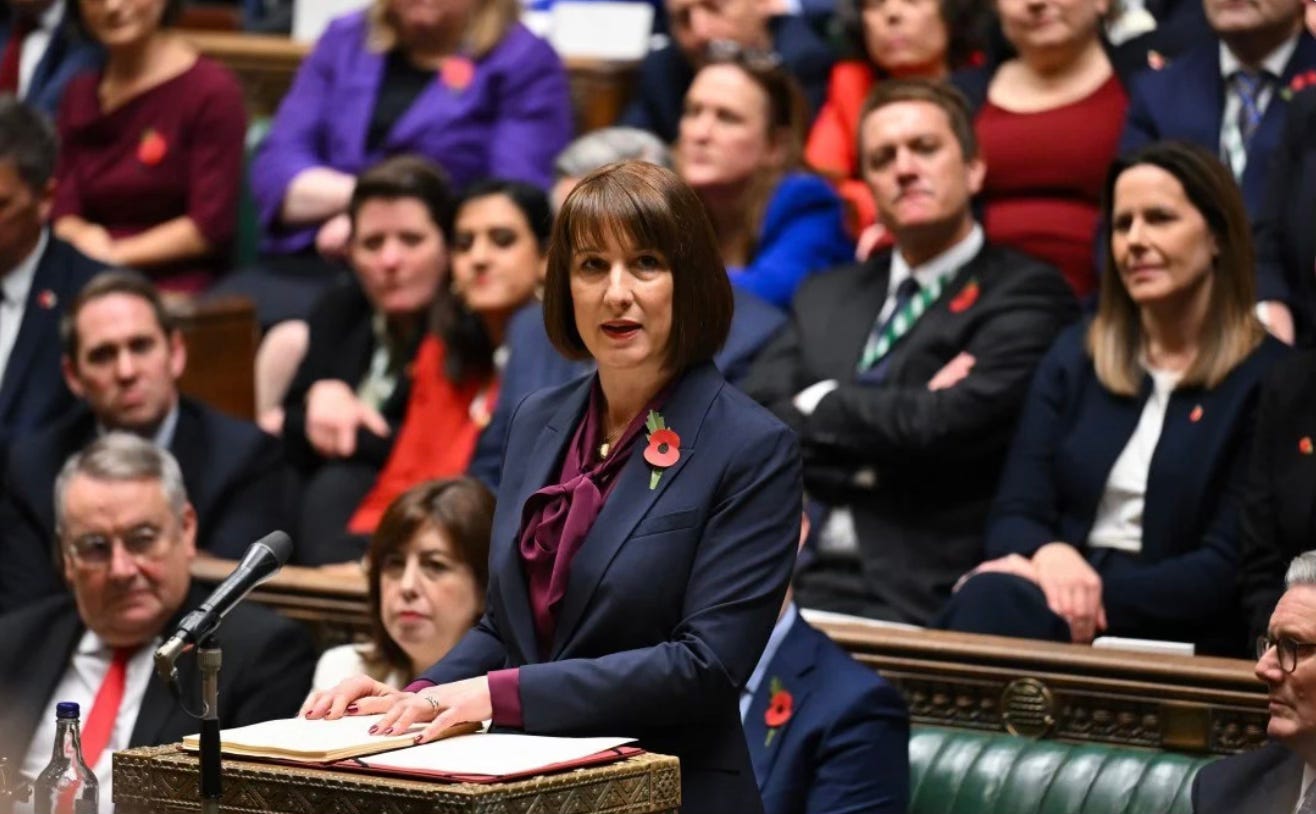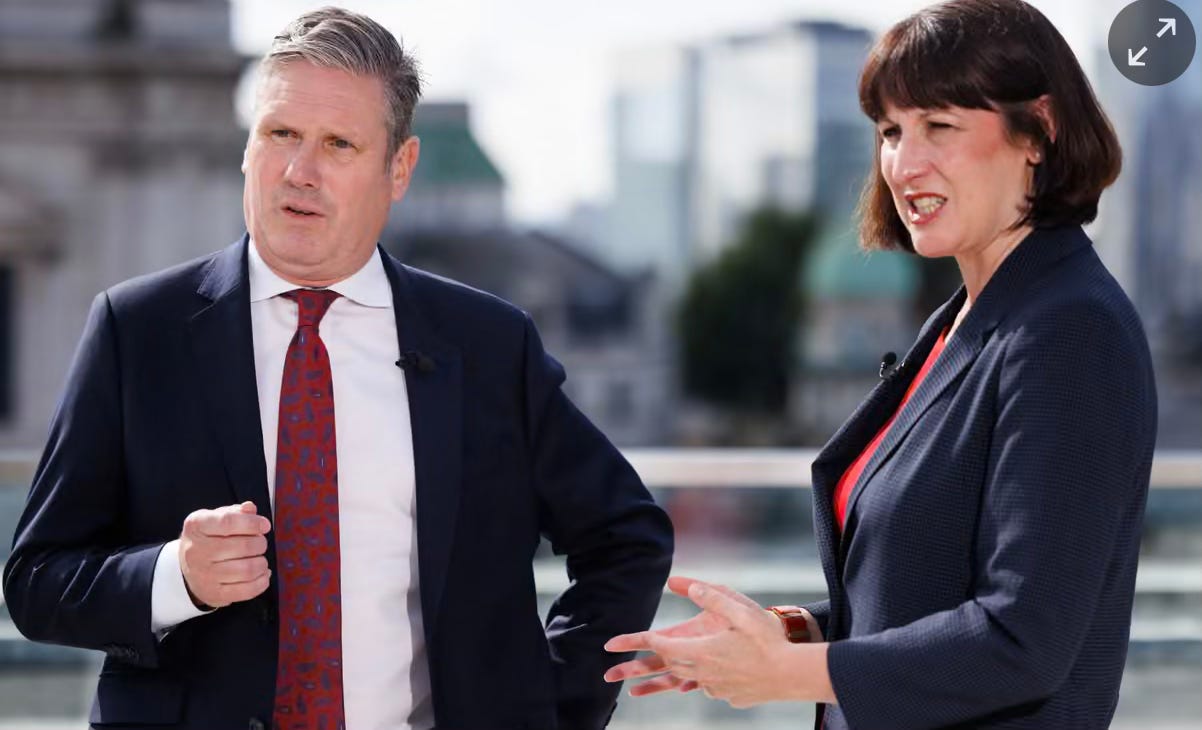Labour entered government with an overwhelming mandate for change, but seven months in, the promised transformation is nowhere to be seen. Instead, we are witnessing a government retreating into the same old economic orthodoxy—cutting benefits, appeasing the wealthy, and chanting the mantra of "growth" without articulating who will benefit from it. If the past decade of economic failures has taught us anything, it’s that this combination of punitive welfare policies and blinkered economic dogma serves only the wealthy while leaving ordinary people in the dust.
Rather than seizing the opportunity to lay out a bold vision for the country, Labour seems paralysed by fear—fear of alienating corporate interests, fear of being branded as too radical, and fear of challenging a status quo that has already failed millions. In this vacuum, policies that could make a real difference are being abandoned or diluted, replaced with vague slogans and half-hearted gestures. This failure is evident across multiple policy areas: welfare cuts, economic stagnation, green policy reversals, and an unwillingness to challenge entrenched wealth.
Council Tax is rising steeply, water bills are set to increase despite corporate misconduct, and Labour refuses to lift the two-child benefit cap—leaving struggling families in crisis. Their much vaunted Non-Dom tax reforms have been watered down, sending a clear message about where their priorities lie. Meanwhile, their continued fixation on economic ‘growth’ offers little reassurance to those facing a deepening cost-of-living crisis.
This article examines how Labour’s early choices are shaping a government that is looking increasingly indistinguishable from its predecessors and asks: if not for the working class, then who exactly are they governing for?
The War on Welfare
Labour's abandonment of working-class priorities extends beyond welfare sanctions. The party has also scrapped the Winter Fuel Allowance for the elderly, leaving many struggling to heat their homes. Meanwhile, their refusal to lift the two-child benefit cap condemns thousands of children to poverty, ensuring that those most vulnerable continue to suffer under a policy initially introduced by the Conservatives. These decisions further solidify Labour's shift away from policies that meaningfully support those in need.
Reeves' rhetoric on benefits is straight out of the Tory playbook: "We’ll be tougher than the Tories," she boasted (Mason, 2023). Now, as Labour's Chancellor, she is hell-bent on proving that she will not just continue the Conservatives' attack on the welfare state, but double down on it.
Under her vision, the already brutal sanctions regime on benefits claimants is likely to tighten even further. She echoes the tired myth that there are swathes of people who “could work but won’t” (Jones, 2024). This ignores the real issues at play: the rise in long-term illness, the failure of the state to provide adequate childcare, and the simple fact that many jobs available are insecure, underpaid, and lack dignity.
Instead of punitive measures, Labour could implement policies that truly support people into stable, well-paid employment—expanding access to training, improving working conditions, and addressing systemic barriers such as unaffordable childcare and inadequate mental health support. However, Reeves’ approach suggests she is more interested in being seen as "tough" rather than actually fixing the underlying causes of economic hardship.
Her stance is a gift to the right-wing press, which has long sought to demonise those on benefits. Headlines about 'scroungers' and 'shirkers' will write themselves, all while ignoring the biggest welfare leeches in the country—the corporations and landlords who rake in billions from government subsidies while contributing next to nothing in return (Dorling, 2022).
The Cult of Growth
Reeves' obsession with growth is eerily reminiscent of Liz Truss’ disastrous mini-budget era (Elliott, 2023). But just like Truss, she offers no real answers as to what kind of growth she wants, who will benefit from it, and how it will be achieved.
Growth for whom? For the billionaires stashing their money offshore? For the big corporations dodging taxes? For the energy firms posting record profits while millions struggle to heat their homes? If growth simply means boosting GDP without addressing inequality, then it’s a meaningless slogan that does nothing to improve the lives of working people (Piketty, 2014).
Instead of relying on old neoliberal formulas, Labour could focus on sustainable, inclusive growth—investing in green infrastructure, public services, and industrial strategy to ensure prosperity is shared. The failure to articulate such a vision makes Reeves' economic plan appear little more than reheated austerity politics.
Abandoning Green Commitments in the Name of Growth
After making grand promises on green policies before the election, Labour is now showing its true colours. Reeves and Labour have signalled their willingness to sacrifice environmental commitments in pursuit of growth, backing plans to open a new runway at Heathrow and even considering granting more licenses to drill for oil in Rosebank. These actions betray not only their own pledges but also the growing consensus that climate action cannot wait. Instead of leading the transition to a green economy, Labour appears to be falling back on the same old fossil-fuelled economic model that will only deepen the climate crisis (Carrington, 2024).
Instead of prioritising short-term economic indicators, Labour could be investing in a genuine green transition—expanding renewable energy, retrofitting homes, and creating secure green jobs. The abandonment of these commitments in favour of corporate interests shows a government more concerned with winning business approval than tackling the climate emergency.
The Fear of Being Radical
Reeves and Labour have also watered down their Non-Dom policy, again sending a clear signal about who they truly represent—and who they do not. The initial promise to scrap Non-Dom tax status, a loophole that benefits the ultra-wealthy, has now been diluted, reinforcing Labour’s shift towards appeasing business elites rather than tackling wealth inequality (Elliott, 2024). By failing to deliver on this key reform, Labour demonstrates that it is unwilling to take meaningful action against the entrenched privileges of the rich.
On the back of all of this, we are facing a doubling-down on austerity, our Council Taxes rising by as much as 10% on last year's increase, and the prospect of water bills increasing. Water boards have been fined for sewage discharges and are being allowed to pass that cost onto the consumer, all the while continuing to turn over bloated profits. Rather than challenging these injustices, Labour seems content to let the burden fall on ordinary people instead of the corporations responsible.
Even more tellingly, when Reform UK is calling for the renationalisation of Thames Water while Labour remains silent, it becomes clear where Labour's priorities truly lie. The fact that a right-wing populist party is making a stronger case for public ownership than the supposed party of working people should be a damning indictment of where Starmer and Reeves have positioned Labour.
Reeves’ economic agenda is driven by fear—fear of being seen as too left-wing, fear of upsetting the markets, fear of deviating from a neoliberal consensus that has failed millions (Chang, 2011). She wants Labour to be seen as the ‘party of business,’ but business under our current system thrives on low wages, weak workers' rights, and a state that punishes the poor while protecting the rich.
Instead of bowing to the economic status quo, Labour could offer a genuinely transformative agenda—one that prioritises well-funded public services, workers' rights, and democratic control over key industries. Without such ambition, Labour risks merely managing decline rather than changing the economic order.
The Looming Populist Backlash
At this point, we genuinely have no idea who Labour expects to vote for them in the next General Election. Maybe they’re banking on people being fearful of Reform UK and voting for Labour just to keep them out—similar to the 2024 election, when many voted Labour simply to oust the Tories. Even then, Labour seemed vague and non-committal, too scared to take a clear position in case it put off traditional Tory voters.
The problem now is that Labour has no ideology, no vision, and no narrative to show where they want to take the UK. Instead, there is just this weird déjà-vu soundbite of 'Growth!'—without any tangible explanation of how this elusive growth will actually benefit the public or alleviate the cost-of-living crisis.
If Reeves continues down this road, she may find that her desire to be taken seriously by the establishment costs Labour the very people it is supposed to represent. A failure to deliver meaningful economic change—combined with rhetoric that alienates working-class voters—could create the conditions for the rise of an even more reactionary right-wing movement.
History has shown that when centrist parties fail to tackle economic injustice, the vacuum is often filled by nationalist and authoritarian forces. Labour is not just failing to challenge this trend—they are enabling it. Their refusal to embrace a transformative vision leaves voters with little choice but to seek alternatives, even if those alternatives are dangerous.
This is not just incompetence—it is a deliberate choice. A government that refuses to challenge inequality, prioritises corporate interests, and abandons the people it claims to represent cannot be surprised when those same people look elsewhere for leadership. If Labour continues on this trajectory, the next backlash may not just be against them, but against the two-party system, as they could hand Reform UK an open goal. Though we would never vote for Reform UK ourselves, we can understand their appeal —those who watched the Tories ignore their hardships for years, only to see Labour do the same. The betrayal is even starker because people expected better from Labour. They came into government on the promise of fixing this mess, yet seven months in, they are reinforcing it.
References
Carrington, D. (2024) ‘Labour’s Green U-Turn: Heathrow and Rosebank in the Spotlight’, The Guardian, 2 February. Available at: [URL]
Chang, H-J. (2011) 23 Things They Don't Tell You About Capitalism. London: Penguin.
Dorling, D. (2022) Shattered Nation: Inequality and the Geography of A Failing State. London: Verso.
Elliott, L. (2023) ‘Labour’s Growth Gamble’, The Guardian, 12 November. Available at: [URL]
Elliott, L. (2024) ‘Labour Retreats on Non-Dom Reform’, The Guardian, 15 January. Available at: [URL]
Jones, O. (2024) The Establishment: And How They Get Away With It. London: Penguin.
Mason, P. (2023) ‘Rachel Reeves and the Politics of Fiscal Fear’, New Statesman, 5 October. Available at: [URL]
Mazzucato, M. (2018) The Value of Everything: Making and Taking in the Global Economy. London: Allen Lane.
Piketty, T. (2014) Capital in the Twenty-First Century. Cambridge, MA: Harvard University Press.





Unfortunately all very true and the parallels with the Democrats in the US couldn't be more clear. Unless Labour starts to think about wealth inequality, public services and helping the poor rather than demonising them, they're opening the door to Reform. Because what's the point of them if they're just going to give us more of the same? I hate Farage, but at least he doesn't lie about what he is.
This article is absolutely superb! It is detailed, thorough, and very accurate.
Who will vote for them? I’m desperate to keep Farage out of- and that is my only reason. I desperately want to vote Green but although they are really strong in my town at local level, I’m not sure that they’ll win at constituency level.